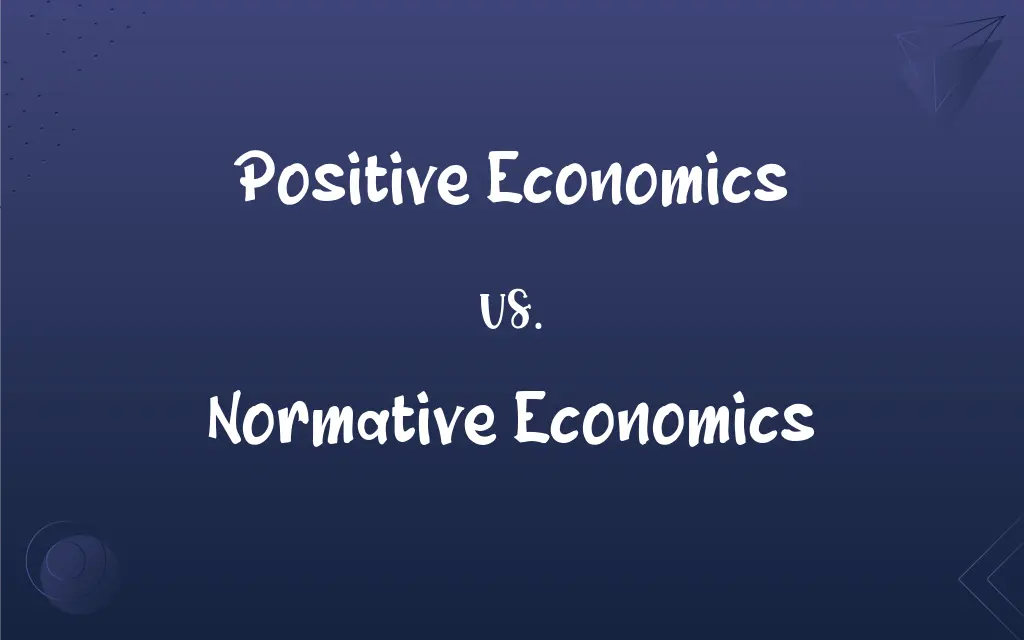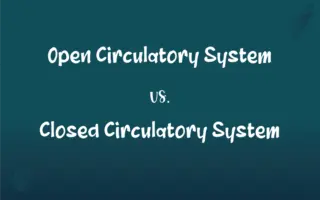Positive Economics vs. Normative Economics: What's the Difference?
Edited by Aimie Carlson || By Harlon Moss || Updated on October 26, 2023
Positive economics describes what is and can be tested; normative economics prescribes what ought to be, based on values.

Key Differences
Positive economics is the branch of economics that focuses on the objective and fact-based aspects of economic phenomena. It deals with "what is" rather than "what should be." Through positive economics, economists aim to understand and explain the cause and effect relationships in the economy. On the other hand, normative economics deals with value judgments about economic fairness or what the economy should be like. It's more subjective, offering prescriptions based on societal values.
While positive economics might describe the effects of a new tax policy, normative economics might argue whether it's right or fair. Positive economics relies on facts and empirical evidence for its conclusions. It can be tested and validated.
For instance, if a hypothesis in positive economics is false, it can be proven wrong with data. In contrast, normative economics is rooted in opinions and values. One cannot prove a normative statement right or wrong merely with data; it's more about ethical perspectives.
To summarize, while positive economics seeks to explain economic behavior, normative economics offers recommendations based on societal values.
Comparison Chart
Nature
Descriptive
Prescriptive
ADVERTISEMENT
Based On
Facts and empirical evidence
Values and judgments
Purpose
Understand and explain
Recommend and guide
Testability
Can be tested with data
Cannot be validated with just data
Example
Analyzing the impact of a tax cut on GDP
Arguing whether a tax cut is fair or beneficial for society
Positive Economics and Normative Economics Definitions
Positive Economics
Positive economics can be empirically tested.
Using data, positive economics can verify if a policy increases unemployment.
ADVERTISEMENT
Normative Economics
Normative economics cannot be validated solely with data.
A normative statement like Everyone deserves a living wage can't be tested with just numbers.
Positive Economics
Positive economics is based on factual observations.
Through positive economics, we can determine the effects of inflation on consumer spending.
Normative Economics
Normative economics deals with "what should be."
Normative economics could argue for higher taxes on the rich.
Positive Economics
Positive economics is the objective analysis of economic events.
Positive economics studies the relationship between supply and demand.
Normative Economics
Normative economics involves value judgments.
Normative economics might debate the ethics of a free market.
Positive Economics
Positive economics deals with "what is."
Positive economics observes that when prices rise, demand often falls.
Normative Economics
Normative economics offers prescriptions for economic issues.
Normative economics might suggest policies for ideal wealth distribution.
Positive Economics
Positive economics avoids value judgments.
Positive economics won't comment on the fairness of income distribution.
Normative Economics
Normative economics is based on personal and societal values.
Normative economics may promote policies ensuring basic healthcare for all.
FAQs
Is normative economics subjective?
Yes, normative economics involves subjective value judgments about what ought to be.
Is normative economics based on opinions?
Normative economics is based on values and ethical perspectives, making it more opinion-driven.
Can positive economics be tested?
Yes, positive economics is empirical and can be tested with data.
Are normative economics' recommendations universally agreed upon?
No, they often vary based on individual or societal values.
Are all economic facts under positive economics?
Positive economics deals with factual, testable observations, but not all facts are economic in nature.
What drives normative economics?
Ethical perspectives, societal values, and desired outcomes.
Is one more important than the other?
Both are essential. Positive informs us, while normative guides us.
What might normative economics advocate for?
It could advocate for policies based on notions of fairness, equality, or any societal value.
What's a practical use of positive economics?
Understanding the effects of a new tax policy on consumer behavior.
How do positive and normative economics relate?
Positive provides the facts, while normative suggests actions based on those facts and values.
Are the boundaries between positive and normative economics always clear?
While distinct in definition, in practice, the lines can sometimes blur.
Can positive economics make policy recommendations?
It describes and explains but doesn't inherently recommend; that's the domain of normative economics.
What is positive economics concerned with?
Positive economics deals with objective descriptions and explanations of economic phenomena.
How does positive economics gather its findings?
Through observation, data collection, and empirical analysis.
Why is normative economics important?
It guides policy decisions based on societal goals and values.
Can normative economics influence public policy?
Yes, as it provides recommendations based on societal objectives.
Can a statement be both positive and normative?
A statement can contain elements of both, but by definition, they serve different purposes.
How do economists handle their biases?
In positive economics, they aim for objectivity. In normative, biases are inherent due to value judgments.
Do all economists agree on normative prescriptions?
No, normative views often differ based on individual or societal values.
Is positive economics value-free?
It aims to be, focusing on objective analysis without judgments.
About Author
Written by
Harlon MossHarlon is a seasoned quality moderator and accomplished content writer for Difference Wiki. An alumnus of the prestigious University of California, he earned his degree in Computer Science. Leveraging his academic background, Harlon brings a meticulous and informed perspective to his work, ensuring content accuracy and excellence.
Edited by
Aimie CarlsonAimie Carlson, holding a master's degree in English literature, is a fervent English language enthusiast. She lends her writing talents to Difference Wiki, a prominent website that specializes in comparisons, offering readers insightful analyses that both captivate and inform.































































